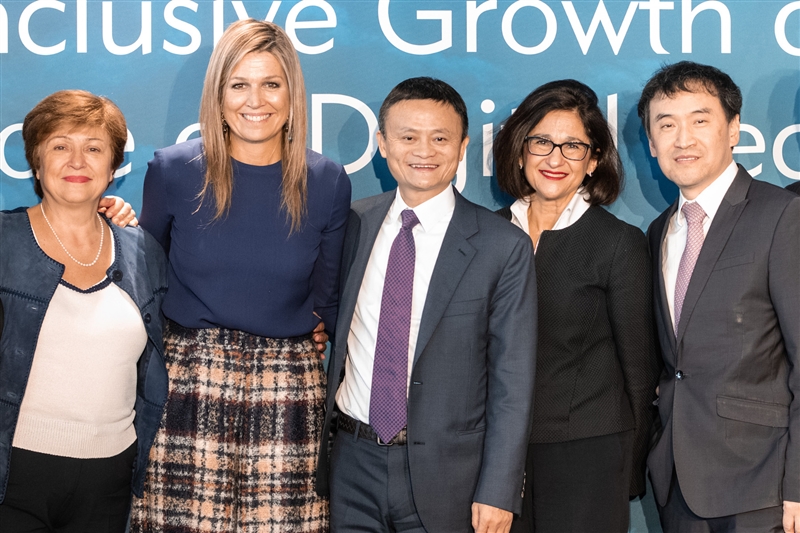
Luohan Academy – an open research institute initiated by Alibaba Group Holding Limited (NYSE: BABA) – today released its first report examining the oft-debated relationship between digital technology and economic growth at the 2019 World Economic Forum in Davos. The report demonstrates why digital technology can drive inclusive growth in ways previous technology revolutions did not when policies and public-private sector cooperation are supportive.
The report was launched at an event co-hosted with the World Bank, and featured speeches and a panel discussion with high-profile experts including HM Queen Maxima of the Netherlands and UN Special Advocate for Inclusive Finance and Development; Kristalina Georgieva, CEO of the World Bank; Michael Spence, Professor of Economics at New York University and Nobel Prize Winner; Jack Ma, Alibaba Group
Executive Chairman, and Chen Long, Director of Luohan Academy. More than 100 delegates from the World Economic Forum attended the launch event, including government officials, chief executives, academics, and heads of international organizations and development agencies.
The report “Digital Technology and Inclusive Growth”, details why the benefits of the current digital revolution can be more evenly distributed than they were in previous technological revolutions. At the macro level, widespread adoption and application of digital technology is no longer dependent on level of income and economic development. At the micro level, digital technology is making it easier for consumers to start businesses, reach consumers, and access financing. Using China as a case study, the report illustrates how digital technologies can provide more access to economic opportunity in ways not possible previously.
“Experience in China and other emerging markets shows the tremendous potential of a new growth path, one that makes development more inclusive and sustainable,” said Chen Long, Director of Luohan Academy. “With public-private joint efforts and the right policies, the digital age presents new opportunities for emerging markets that did not exist before.”
This report identifies where digital technologies have made a material difference for inclusive growth in China, and offers some insights on how to apply the lessons learned in China in other markets. Some key findings include:
- Lowering the skill threshold: To promote digital penetration, lowering the skill threshold needed to use technology is as important as raising the level of skills. For example, in rural Taobao villages in China, “e-tailer households” that participate in e-commerce earn more than double the income of non-e-tailer households at every education level because the skills can be learned on the job; no formal education required.
- Leveraging digital platforms: Digital platforms represent a new form of exchange and coordination to create an ecosystem for inclusive growth. It is a free-spinning “wheel” that connects numerous consumers and producers, and facilities interactions with very low cost, high efficiency, and reliability.
- Forming effective public-private partnerships: It is more important than ever for the public sector to create a benign macro environment for the private sector to grow and make necessary investments for the population to access digital technology.
- Managing unanticipated effects: In the digital age, there have been concerns about real and complex issues such as technological unemployment, abuse of private information, lagging competition policy, and increased inequality. The first step to address these challenges is to separate facts from speculation and anxiety. The evidence in China shows that the benefits of new market access and opportunities are more pronounced in less developed countries.
“This report on digitally enabled growth patterns in China is very interesting. The data show that the mobile internet, e-commerce, mobile payments and internet-based financial services together have accelerated overall growth and produced startlingly inclusive growth patterns in multiple dimensions. The report documents this, and explains why these effects occur,” said Michael Spence, 2001 Nobel Prize Laureate in Economics and professor at New York University. “In conjunction with experience in other developing countries, there is a very convincing case that digitally-enabled, platform-based ecosystems are a new and powerful growth engine.”
Launched in June 2018 in Hangzhou, the Luohan Academy is focused on addressing universal challenges that arise from the rapid development of digital technologies. With 16 Nobel Prize laureates and prominent academics as committee members, the institute aims at bringing together top scholars in the world to study the most pressing issues of the digital economy and advance the research of technology and its impact on humanity.










